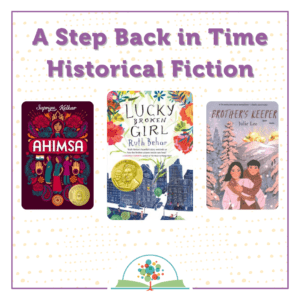10 May A Step Back in Time: Historical Fiction Booklist
Historical fiction is an interesting genre because it can come to be in two different ways. The first way is that someone writes a contemporary story about a time of the past. The second is when a book’s once-contemporary content becomes a part of history. Here are three historical fiction books written in the first way and one written in the second!
Historical Fiction to check out
Lucky Broken Girl by Ruth Behar
Lucky Broken Girl is about a young girl named Ruthie who is bedridden in a body cast after a car accident. Inspired partly by the author’s life, the book focuses on Ruthie’s journey as she learns more about the importance of community, the power of art, and the fragility of life.
Ahimsa (literally translated as “noninjury”) is the principle of not harming other living things. Similarly, Ahimsa focuses on the nonviolent resistance led by Gandhi in India during the 1940’s. The book follows Anjali, whose mother joins Gandhi’s movement for freedom—highlighting the actions and changes that came with the fight for independence.
Brother’s Keeper follows Sora as her family makes the decision to flee to the city of Busan as war breaks out around them. Things don’t go as planned. Now, it’s just Sora and her brother, traveling through the war torn land by themselves, hoping to get to Busan safely. Set North and South Korea in 1950, Brother’s Keeper highlights the struggles of war and the people it affected.
Little Women by Louisa May Alcott
When Louisa May Alcott first published Little Women in 1868, the book would have been considered what we now call “contemporary realistic fiction,” but as is the case with all contemporary works, as the years passed and times changed, the book eventually was categorized as historical fiction. However, this change in categorization does not change the central theme of Little Women. The March sisters remain relevant because they understand the struggle of growing up. Through them, readers can better understand the world as it was, while perhaps learning about the world today.




